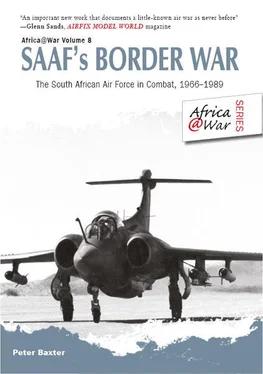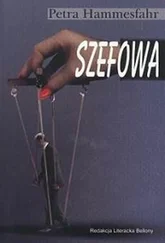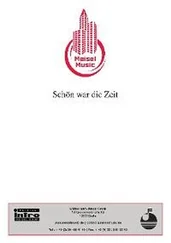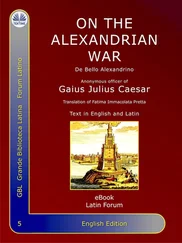Peter Baxter - SAAF's Border War
Здесь есть возможность читать онлайн «Peter Baxter - SAAF's Border War» весь текст электронной книги совершенно бесплатно (целиком полную версию без сокращений). В некоторых случаях можно слушать аудио, скачать через торрент в формате fb2 и присутствует краткое содержание. Город: Solihull, Год выпуска: 2013, ISBN: 2013, Издательство: Helion & Company, Жанр: military_history, на английском языке. Описание произведения, (предисловие) а так же отзывы посетителей доступны на портале библиотеки ЛибКат.
- Название:SAAF's Border War
- Автор:
- Издательство:Helion & Company
- Жанр:
- Год:2013
- Город:Solihull
- ISBN:978-1-908916-23-5
- Рейтинг книги:3 / 5. Голосов: 1
-
Избранное:Добавить в избранное
- Отзывы:
-
Ваша оценка:
- 60
- 1
- 2
- 3
- 4
- 5
SAAF's Border War: краткое содержание, описание и аннотация
Предлагаем к чтению аннотацию, описание, краткое содержание или предисловие (зависит от того, что написал сам автор книги «SAAF's Border War»). Если вы не нашли необходимую информацию о книге — напишите в комментариях, мы постараемся отыскать её.
SAAF's Border War — читать онлайн бесплатно полную книгу (весь текст) целиком
Ниже представлен текст книги, разбитый по страницам. Система сохранения места последней прочитанной страницы, позволяет с удобством читать онлайн бесплатно книгу «SAAF's Border War», без необходимости каждый раз заново искать на чём Вы остановились. Поставьте закладку, и сможете в любой момент перейти на страницу, на которой закончили чтение.
Интервал:
Закладка:
It therefore goes without saying that in the aftermath of the Napoleonic Wars when the British inherited the bulk of East Indian trade interests and consequently took over the administration of the Cape for much the same reasons as the Dutch had, these far-flung Afrikaner communities of the sub-continent would suddenly feel deeply impinged-upon and wholly unwilling to submit to the far more intrusive style of territorial administration that the British tended to introduce.


From that point on a deep antipathy was born between the two races, felt most acutely by the Afrikaner, for it was their Abrahamic view of themselves as a gifted race that was being compromised and their long-cherished liberties that were being curtailed. In the early 1800s the more radical among the Afrikaner leadership began to ponder an exodus across the Orange River, then the farthest limit of organized European settlement, and north into the great unknown interior in order that they might found a new nation apart from the British and beyond any trace of outside interference. Thus, during the 1830s and 1840s, one of the most dramatic human migrations ever recorded played out as the volk , the people, decamped from the Cape in large numbers and struck north into the great unknown.
From this great defining event of the Afrikaner nation emerged two independent republics, the Orange Free State and the Transvaal. This rendered the sub-continent south of the Limpopo River a patchwork of colonies and half-republics that were locked in an extremely unhappy marriage of proximity which, once again, tended to favour the more progressive and modernist British. This fact was driven home most cruelly when the first diamonds began to be unearthed in the dry soil of Griqualand West. A swath of country of little natural appeal, long ignored by both the British of the Cape and the Boer of the Orange Free State, and nominally falling under Orange Free State territorial claim, almost overnight became of vital strategic importance to both, and in the classic style of ‘Britannia waives the rules’ was arbitrarily delineated to the Cape whose economy it thereafter magnificently transformed.
The same was true for gold which was discovered in the Transvaal in enormous quantities and which in 1886 set in motion a gold rush that was to change the political and social landscape of the republic in ways that dismayed the isolationist Boer. Neither joy nor relief was brought to the Transvaal by this great discovery; it instead flooded the key economic centres of the republic with a deluge of fortune seekers from all over the known world in a classic gold rush scenario, threatening to sink the heavy republican boat now swilling to the gunwales with British capital and influence. For how could it have been otherwise? Men like Cecil Rhodes, Alfred Beit and many others possessed a degree of financial acumen that was almost entirely absent among the bedrock of the Afrikaners. These foreigners, uitlanders , amassed huge fortunes in gold and diamonds, gaining phenomenal influence as they did, influence that they tended to direct not toward the interests of the republic but toward greater British control of the region.
From this the inevitability of war grew and, indeed, hostilities erupted on 11 October 1899 in what has come to be known as the Second Anglo–Boer War. The first war had taken place toward the end of 1880 and had little military, but massive political, significance. Although the Boers were inevitably defeated, the military lore of the Anglo–Boer War spins a tale of such courage, commitment, endurance and Christian-like fortitude on the part of the conquered that, and not only in their own eyes, the Boer without doubt won the moral war.
From this defining experience, however, the chastened Afrikaner nation threw up international statesmen of the calibre of Louis Botha and Jan Smuts. For newcomers to South African history, both these men had been key guerrilla leaders during the closing phases of the Anglo–Boer War, each in his own theatre fighting the British with extraordinary creativity and absolute commitment – thereafter transmogrifying into British statesmen at the helm of an unquiet British crown dominion.
It was this curious fact that complicated South African involvement in the First World War. Upon the signing of a peace agreement, the British had drawn the curtain on the Anglo–Boer War, accepting the investiture of the Union of South Africa into the British imperial family – thereafter moving on to matters of European instability – with little thought given to how the defeated grassroots Afrikaans-speakers of South Africa might view the evaporation of their republics and their implied fealty to the hated institution of the British Crown. Botha and Smuts effectively led this new British overseas territory, serving as British proxies. This naturally enraged many among their erstwhile followers who saw in this a betrayal of the blood of their comrades and of their Afrikaner identity.
Thus, when the task was given to Prime Minister Botha to deal with an entrenched enemy force in the adjacent German territory of South West Africa, many on the ground felt that it was not the Germans who were the natural enemies of South Africa but the British. A brief and somewhat quixotic rebellion occurred among front-line South African units that, although it did not particularly threaten South Africa as a crown dominion, did complicate military preparations for the occupation of South West Africa, giving hope to some that with German support the British could be overthrown and the republics re-instituted.
In the end the disturbance was put down and a brilliant campaign was fought by the armed forces of South Africa to assume the territory of South West Africa for the Allies and to neutralize the local German garrison force. This was an important moment in the history of South Africa, in particular with regards to how matters would evolve later in the century, for after the war the territory was made over to South Africa as a League of Nations mandate, effectively handing it over to South Africa as something more than a colony but somewhat less than a fifth province. At a later point, and in a more enlightened global political environment, pressure would be brought to bear against South Africa to relinquish control of the territory which, under the influence of a more nationalistic mind set, she refused to do.
This then sets the stage for the war that would ignite some 50 years later as indigenous Namibians sought to reclaim control of the territory through popular revolution. This state of affairs, of course, was not unique to South Africa. The power of European empire had been deeply compromised by the events of the First World War and even more so by the Second. The Atlantic Charter, a policy document signed by both Franklin D. Roosevelt and Winston Churchill, sought to define the character of a post-war globe, pivotal to which would be the right to self-determination of all the peoples of the world. The first substantive territory to respond to this was India which was granted independence in 1948, followed by a raft of British, French and other sundry European overseas territories across the colonial spectrum.
In Africa the colonies of pure economic interest – those, for example, that hosted limited independent European settlement other than expatriate economic or administrative staff – were handed over relatively painlessly. Others, however, such as Kenya and Algeria and, farther south, Rhodesia, Mozambique and Angola, all of which had been extensively settled by European populations that derived their existence from a local economy, held on for some sort of guarantee of political predominance over the black majority, or parity at the very least, eventually becoming the focus of revolutionary wars that now define much of the mythology of the black liberation struggle.
Читать дальшеИнтервал:
Закладка:
Похожие книги на «SAAF's Border War»
Представляем Вашему вниманию похожие книги на «SAAF's Border War» списком для выбора. Мы отобрали схожую по названию и смыслу литературу в надежде предоставить читателям больше вариантов отыскать новые, интересные, ещё непрочитанные произведения.
Обсуждение, отзывы о книге «SAAF's Border War» и просто собственные мнения читателей. Оставьте ваши комментарии, напишите, что Вы думаете о произведении, его смысле или главных героях. Укажите что конкретно понравилось, а что нет, и почему Вы так считаете.












